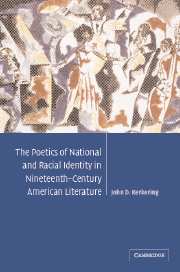Book contents
- Frontmatter
- Contents
- List of illustrations
- Acknowledgments
- List of abbreviations
- Introduction: the poetics of identity
- PART I THE POETICS OF NATIONAL IDENTITY
- 1 “We are five-and-forty”: meter and national identity in Sir Walter Scott
- 2 “Our sacred Union,” “our beloved Apalachia”: nation and genius loci in Hawthorne and Simms
- PART II THE POETICS OF RACIAL IDENTITY
- Conclusion: the conservation of identities
- Notes
- Bibliography
- Index
2 - “Our sacred Union,” “our beloved Apalachia”: nation and genius loci in Hawthorne and Simms
Published online by Cambridge University Press: 22 September 2009
- Frontmatter
- Contents
- List of illustrations
- Acknowledgments
- List of abbreviations
- Introduction: the poetics of identity
- PART I THE POETICS OF NATIONAL IDENTITY
- 1 “We are five-and-forty”: meter and national identity in Sir Walter Scott
- 2 “Our sacred Union,” “our beloved Apalachia”: nation and genius loci in Hawthorne and Simms
- PART II THE POETICS OF RACIAL IDENTITY
- Conclusion: the conservation of identities
- Notes
- Bibliography
- Index
Summary
People have always had a strong sense of place. The Romans spoke of the genius loci, the “spirit of a place,” and we can understand their meaning readily today, even if the spirit for us is a feeling rather than a deity.
– American Places: Encounters with HistoryJust five years after Walter Scott vowed to “keep sight of both” Scottish national identity and the British Union's integrity, William Gilmore Simms found himself engaged in a similar controversy over Union jurisdiction – in Simms's case, the jurisdiction of the US federal Union over his home town of Charleston, South Carolina. As Editor of the Charleston City Gazette in 1831, Simms published a July 4 paper featuring his poem “Union and Freedom,” a work that aligns the revolutionary liberation from British colonial rule with the continued sovereignty of the American Union:
And dear be the freedom they won for our nation,
And firm be the Union that freedom secures;
Let no parricide hand seek to pluck from its station,
The flag that streams forth in its pride from our shores;
May no son of our soil,
In inglorious toil,
Assail the bright emblem that floats on our view;
Let not that standard quail,
Let not those stripes grow pale,
Take not one star from our banner of blue.
- Type
- Chapter
- Information
- The Poetics of National and Racial Identity in Nineteenth-Century American Literature , pp. 68 - 110Publisher: Cambridge University PressPrint publication year: 2003

